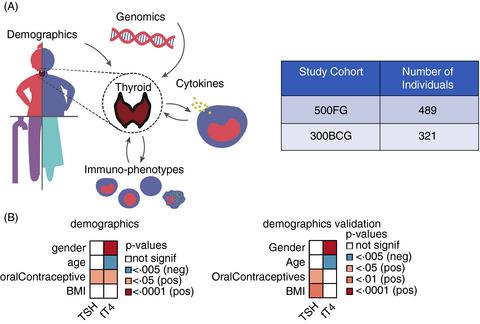当前位置:
X-MOL 学术
›
Immunology
›
论文详情
Our official English website, www.x-mol.net, welcomes your
feedback! (Note: you will need to create a separate account there.)
Thyrotrophin and thyroxine support immune homeostasis in humans
Immunology ( IF 4.9 ) Pub Date : 2021-01-17 , DOI: 10.1111/imm.13306 Martin Jaeger 1, 2, 3 , Yvette J E Sloot 1, 3 , Rob Ter Horst 2 , Xiaojing Chu 4 , Hans J P M Koenen 3, 5 , Valerie A C M Koeken 2, 3 , Simone J C F M Moorlag 2 , Charlotte J de Bree 2, 6, 7 , Vera P Mourits 2, 3 , Heidi Lemmers 2 , Helga Dijkstra 2 , Marco Medici 1 , Antonius E van Herwaarden 8 , Irma Joosten 3, 5 , Leo A B Joosten 2 , Yang Li 2, 4 , Johannes W A Smit 1 , Mihai G Netea 2, 9 , Romana T Netea-Maier 1
Immunology ( IF 4.9 ) Pub Date : 2021-01-17 , DOI: 10.1111/imm.13306 Martin Jaeger 1, 2, 3 , Yvette J E Sloot 1, 3 , Rob Ter Horst 2 , Xiaojing Chu 4 , Hans J P M Koenen 3, 5 , Valerie A C M Koeken 2, 3 , Simone J C F M Moorlag 2 , Charlotte J de Bree 2, 6, 7 , Vera P Mourits 2, 3 , Heidi Lemmers 2 , Helga Dijkstra 2 , Marco Medici 1 , Antonius E van Herwaarden 8 , Irma Joosten 3, 5 , Leo A B Joosten 2 , Yang Li 2, 4 , Johannes W A Smit 1 , Mihai G Netea 2, 9 , Romana T Netea-Maier 1
Affiliation

|
The endocrine and the immune systems interact by sharing receptors for hormones and cytokines, cross‐control and feedback mechanisms. To date, no comprehensive study has assessed the impact of thyroid hormones on immune homeostasis. By studying immune phenotype (cell populations, antibody concentrations, circulating cytokines, adipokines and acute‐phase proteins, monocyte–platelet interactions and cytokine production capacity) in two large independent cohorts of healthy volunteers of Western European descent from the Human Functional Genomics Project (500FG and 300BCG cohorts), we identified a crucial role of the thyroid hormone thyroxin (T4) and thyroid‐stimulating hormone (TSH) on the homeostasis of lymphocyte populations. TSH concentrations were strongly associated with multiple populations of both effector and regulatory T cells, whereas B‐cell populations were significantly associated with free T4 (fT4). In contrast, fT4 and TSH had little impact on myeloid cell populations and cytokine production capacity. Mendelian randomization further supported the role of fT4 for lymphocyte homeostasis. Subsequently, using a genomics approach, we identified genetic variants that influence both fT4 and TSH concentrations and immune responses, and gene set enrichment pathway analysis showed enrichment of fT4‐affected gene expression in B‐cell function pathways, including the CD40 pathway, further supporting the importance of fT4 in the regulation of B‐cell function. In conclusion, we show that thyroid function controls the homeostasis of the lymphoid cell compartment. These findings improve our understanding of the immune responses and open the door for exploring and understanding the role of thyroid hormones in the lymphocyte function during disease.
中文翻译:

促甲状腺素和甲状腺素支持人体免疫稳态
内分泌和免疫系统通过共享激素和细胞因子受体、交叉控制和反馈机制相互作用。迄今为止,还没有全面的研究评估甲状腺激素对免疫稳态的影响。通过在来自人类功能基因组学项目 (500FG) 的两个大型独立西欧健康志愿者队列中研究免疫表型(细胞群、抗体浓度、循环细胞因子、脂肪因子和急性期蛋白、单核细胞-血小板相互作用和细胞因子产生能力)和 300BCG 队列),我们确定了甲状腺激素甲状腺素(T4)和促甲状腺激素(TSH)对淋巴细胞群稳态的关键作用。TSH 浓度与效应 T 细胞和调节性 T 细胞的多个群体密切相关,而 B 细胞群与游离 T4 (fT4) 显着相关。相比之下,fT4 和 TSH 对骨髓细胞群和细胞因子生产能力几乎没有影响。孟德尔随机化进一步支持 fT4 对淋巴细胞稳态的作用。随后,我们使用基因组学方法确定了影响 fT4 和 TSH 浓度和免疫反应的遗传变异,基因集富集途径分析显示 B 细胞功能途径中受 fT4 影响的基因表达的富集,包括 CD40 途径,进一步支持fT4 在调节 B 细胞功能中的重要性。总之,我们表明甲状腺功能控制淋巴细胞室的稳态。
更新日期:2021-01-17
中文翻译:

促甲状腺素和甲状腺素支持人体免疫稳态
内分泌和免疫系统通过共享激素和细胞因子受体、交叉控制和反馈机制相互作用。迄今为止,还没有全面的研究评估甲状腺激素对免疫稳态的影响。通过在来自人类功能基因组学项目 (500FG) 的两个大型独立西欧健康志愿者队列中研究免疫表型(细胞群、抗体浓度、循环细胞因子、脂肪因子和急性期蛋白、单核细胞-血小板相互作用和细胞因子产生能力)和 300BCG 队列),我们确定了甲状腺激素甲状腺素(T4)和促甲状腺激素(TSH)对淋巴细胞群稳态的关键作用。TSH 浓度与效应 T 细胞和调节性 T 细胞的多个群体密切相关,而 B 细胞群与游离 T4 (fT4) 显着相关。相比之下,fT4 和 TSH 对骨髓细胞群和细胞因子生产能力几乎没有影响。孟德尔随机化进一步支持 fT4 对淋巴细胞稳态的作用。随后,我们使用基因组学方法确定了影响 fT4 和 TSH 浓度和免疫反应的遗传变异,基因集富集途径分析显示 B 细胞功能途径中受 fT4 影响的基因表达的富集,包括 CD40 途径,进一步支持fT4 在调节 B 细胞功能中的重要性。总之,我们表明甲状腺功能控制淋巴细胞室的稳态。











































 京公网安备 11010802027423号
京公网安备 11010802027423号